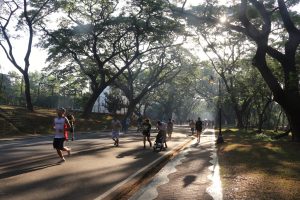The Philippine government announced Monday that it had terminated an agreement with the University of the Philippines (UP) that prohibits state security forces from entering its campuses, leading to protests by students and faculty and fears of academic repression.
Defense Secretary Delfin Lorenzana said he had ended the UP-DND accord, signed in 1989 between the university and then-defense chief Fidel Ramos, citing baseless claims that the Communist Party of the Philippines and New People’s Army (CPP-NPA) are recruiting students on campus.
President Rodrigo Duterte’s government has escalated its “anti-communist” operations in recent months, although critics say it is simply using unfounded accusations in a thinly veiled attempt to crack down on the administration’s political opponents.
The university has a history of political activism dating back to the 1970s, when students at UP-Diliman, the flagship campus in Quezon City, held rallies protesting the rule of dictator Ferdinand Marcos.
In recent years, the UP-Diliman campus has hosted indigenous refugees from the southern island of Mindanao who fled their ancestral lands after military and paramilitary groups forced them from their homes and shuttered their schools.
The government has claimed these are anti-communist activities, although indigenous leaders – along with global rights watchdogs and United Nations human rights experts – have said the communities are being persecuted to clear the land for investors, including mining and agriculture corporations.
Ending the UP-DND accord could put them, along with other student and faculty activists, at risk of state persecution.
On Tuesday, UP President Danilo Concepcion called the termination of the accord “totally unnecessary and unwarranted” and said the defense department had ended the agreement “without prior consultation” from the UP administration.
“Instead of instilling confidence in our police and military, your decision can only sow more confusion and mistrust,” Concepcion said.
But Lorenzana has insisted there’s nothing to worry about. On Wednesday, he said he would talk to UP officials about reconsidering the status of the accord – but only if they explain why some UP students have wound up being killed after joining the NPA, an armed communist guerrilla group.
Lorenzana did not provide evidence for his claim that UP students were recruited while on campus.
The agreement had mandated that state forces must notify the UP administration before entering any of its campuses. Terminating the agreement would give police and military the freedom to enter UP campuses at will.
Duterte has threatened to defund UP over claims it is recruiting students to join the CPP-NPA. In November, the president ranted against the university’s administration after alleging students had called for an academic strike over the government’s slow response to typhoons and the COVID-19 pandemic – even though the strike had actually been called for by students at a different university.
Military officials have also regularly accused the university of harboring communists and have “red-tagged” students and faculty. In June last year, police entered the campus of UP-Cebu and arrested seven protesters attending a rally opposing the country’s controversial anti-terrorism law.
The government has pushed back on claims by UP students and faculty that terminating the accord is yet another crackdown on legal, democratic dissent by an administration increasingly averse to criticism. Presidential spokesperson Harry Roque lost his temper when asked by a TV news anchor about a tweet critical of the decision, calling the question “unfair,” and was roundly mocked on social media.
The military has made its presence felt quickly. On Wednesday, military trucks entered the campus carrying soldiers who claimed to be inspecting urban gardening projects.

































